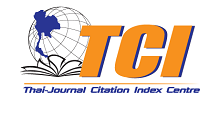แนวคิดโพลิติไซด์กับข้อถกเถียงว่าด้วยมโนทัศน์ด้านการเมืองในการฆ่าล้างเผ่าพันธุ์ศึกษา
คำสำคัญ:
โพลิติไซด์, มโนทัศน์การเมือง, การฆ่าล้างเผ่าพันธุ์, มหฆาตกรรมโดยรัฐบทคัดย่อ
การฆ่าล้างเผ่าพันธุ์ได้รับการยอมรับในฐานะหลักการพื้นฐานของกฎหมายระหว่างประเทศโดยที่ได้ถอดถอนการเมืองออกจากปัจจัยของการฆ่าล้างเผ่าพันธุ์ทำให้ความรุนแรงทางการเมืองชนิดนี้ไม่สามารถสร้างบทสนทนาทางวิชาการด้านรัฐศาสตร์ได้อย่างเป็นระบบ ทั้งที่สมัยหลังสงครามโลกครั้งที่ 2 มีมหฆาตกรรมที่มีรัฐเป็นตัวแสดงสำคัญหลายครั้งและมีเหยื่อสูญเสียชีวิตมากมาย แต่มหฆาตกรรมที่มีเจตนาทางการเมืองเหล่านี้ไม่ถูกรวมเข้าเป็นการฆ่าล้างเผ่าพันธุ์ บทความนี้เป็นการวิเคราะห์เอกสารที่นำเสนอมโนทัศน์โพลิติไซด์ของบาร์บารา ฮาร์ฟฟ์ และเท็ด เกอร์ เพื่อสร้างความเชื่อมโยงวงวิชาการด้านรัฐศาสตร์กับด้านการฆ่าล้างเผ่าพันธุ์ศึกษา จากการศึกษาพบองค์ความรู้ใหม่ คือ โพลิติไซด์เป็นการนิยามความหมายของคำว่า เหยื่อ ซึ่งเป็นกลุ่มที่ถูกมองเป็นภัยคุกคามต่อระบอบการปกครองหรือโครงสร้างอำนาจทางการเมือง ทฤษฎีนี้จึงเป็นการนำการเมืองที่ถูกเบียดขับออกจากนิยามทางกฎหมายให้กลับเข้าสู่นิยามของการฆ่าล้างเผ่าพันธุ์ ทั้งยังเป็นแนวทางใหม่ในการออกแบบนโยบายทางการเมืองเพื่อป้องกันความขัดแย้งในสังคมโลกที่มีความแตกต่างหลากหลาย
Downloads
เอกสารอ้างอิง
Abed, M. (2006). Clarifying the Concept of Genocide. Metaphilosophy. 37 (3), 308-330. DOI:10.1111/j.1467-9973.2006.00443.x
Harff, B. (2003). No Lessons Learned from the Holocaust? Assessing Risks of Genocide and Political Mass Murder since 1955. The American Political Science Review. 97 (1), 57-73.
Harff, B. and Gurr, T. R. (1988). Toward Empirical Theory of Genocides and Politicides: Identification and Measurement of Cases since 1945. International Studies Quarterly. 32 (3), 359-371.
Hinton, A. L. (2002). The Dark Side of Modernity: Toward an Anthropology of Genocide. In Hinton, A. L. (ed.) Annihilating Difference: The Anthropology of Genocide. Berkeley, Los Angeles: University of California Press.
Hsieh, H. F. and Shannon, S. E. (2005). Three Approaches to Qualitative Content Analysis. Qualitative Health Research. 15 (9), 1277-1288.
Lee, T. M. L. (2007). Rethinking the Personal and the Political: Feminist Activism and Civic Engagement. Hypatia. 22 (4), 163–179.
Lemkin, R. (1944). Axis Rule in Occupied Europe: Laws of Occupation, Analysis of Government, Proposals for Redress. Washington, D.C.: Carnegie Endowment for International Peace, Division of International Law.
Luban, D. (2015). Arendt on the Crime of Crimes. Ratio Juris. 28 (3), 307-325.
Luloff, G. (2022). Politicide v. Genocide: An Analysis of the Exclusion of Political Groups from the United Nations Convention. (Bachelor's Thesis). University of Wisconsin. Madison, Wisconsin.
McGoodwin, M. (7 November 2022). Herodotus of Halicarnassus: The History (or Histories, or Inquiries). Retrieved December 6, 2022, from https://www.mcgoodwin.net/pages/otherbooks/herodotus.html
Stanton, G. H. (n.d.). The Logic of the Ten Stages of Genocide. Retrieved May 1, 2023, from genocidewatch.com/tenstages
The Human Rights Web. (27 January 1997). Convention on the Prevention and Punishment of the Crime of Genocide. Retrieved May 13, 2023, from http://www.hrweb.org/legal/genocide.html
Verdeja, E. (2012). The Political Science of Genocide: Outlines of an Emerging Research Agenda. Perspectives on Politics. 10 (2), 307-321.
Zemplényi, L. (9 October 2022). What Is Genocide and What Is Not? Retrieved May 10, 2023, from https://www.hungarianconservative.com/articles/philosophy/what-is-genocide-and-what-is-not/

ดาวน์โหลด
เผยแพร่แล้ว
รูปแบบการอ้างอิง
ฉบับ
ประเภทบทความ
สัญญาอนุญาต
ลิขสิทธิ์ (c) 2024 วารสารบัณฑิตแสงโคมคำ

อนุญาตภายใต้เงื่อนไข Creative Commons Attribution-NonCommercial-NoDerivatives 4.0 International License.





